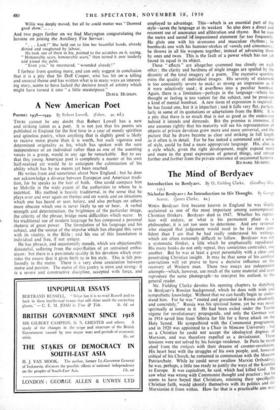A New American Poet
Poems: 5938-1949. By Robert Lowell. (Faber. 95. 6d.) THERE cannot be any doubt that Robert Lowell has a new and striking talent as a poet. It is not just that his poems are published in England for the first time in a year of mostly spiritless and spineless poetry, when anything that is slightly good is likely to receive more praise than it is worth, but such vigorous and determined originality as his, which has spoken with the sure independence of an individual rather than as one of the assenting voices in a group, would in any age be remarkable. But to say that this young American poet is completely a master of his own half-realised art would be to anticipate the culmination of his ability which has by no means yet been reached.
He writes from and sometimes about New England ; but he does not acknowledge a divorce between European and American tradi- tion, for he speaks as the heir of both. One could compare him to Melville in the wide extent of the authorities to whom he is indebted. His method is heavily traditienal, in the sense that he plays over and over again on themes and on words and on situations which one has heard or seen before, and also perhaps on others more obscure which one is never likely to see or hear. A verbal strength and determination, the brightness of the particular image, the celerity of the phrase, bridge most difficulties which occur. In his traditional use of modern language he has composed a personal rhetoric of great power. The foundation of his language and his subject, and the source of the impulse which has charged this verse with its vitality, is the Bible ; and his use of this foundation is individual and free, if not unique. - He has phrases, and occasionally moods, which are objectionably distasteful, suffering from the superfluities of an untrained enthu- siasm: but there is a passionate quality ih his devotion which over- rides the excess that it gives birth to in his style. This is felt pro- foundly in the metre. There is a very close association between metre and passion. The metre of this poetry is stern and strong: it is a severe and constructive discipline, accepted with force, and
employed to advantage. This—which is an essential part of the style—saves the language at its weakest So also does a direct and resonant use of assonance and alliteration and rhyme. But he uses the metre and sound ot impassioned statement far too frequently. He, gluts one with his strenuous and masculine rhythms ; he bombards one with his hammer-strokes of vowels and consonants ; he throws in all his weapons together, instead of advancing them by ones and twos. This is the fault of a power which has not yet found its equal in its object.
These " effects " are altogether crammed too Closely on each other : the clarity and hardness of single images are spoiled by the disunity of the total imagery of a poem. The excessive quantity ruins the quality of individual images. His severity of statement is too consistently severe to make as strong an impression as if it were selectively used ; it overflows into a peculiar bombast. Again, there is a limitation—perhaps in the language—where his thought or feeling is too violent for the subject, and he produces a kind of mental bombast. A new form of expression is required: he has found one, but it is iriverfect ; and it falls very flat, particu- larly in some of its quotations or adaptations from the Bible. It is a pity that there is so much that is not as good as the endeavour behind it intends and demands. But the promise is immense, if one assumes rightly that his maturity will see his representation of objects of private devotion grow more and more universal, and the picture that he draws become as clear and striking in full length as it often is in detail. For he has indeed a command and a sense of style, could he find a more appropriate language. His, also, is a style which, given the right development, might expand more and more to the great expression of general things, and retreat further and further from the private utterance of occasional hysteria.
RICHARD MURPHY.


















































 Previous page
Previous page